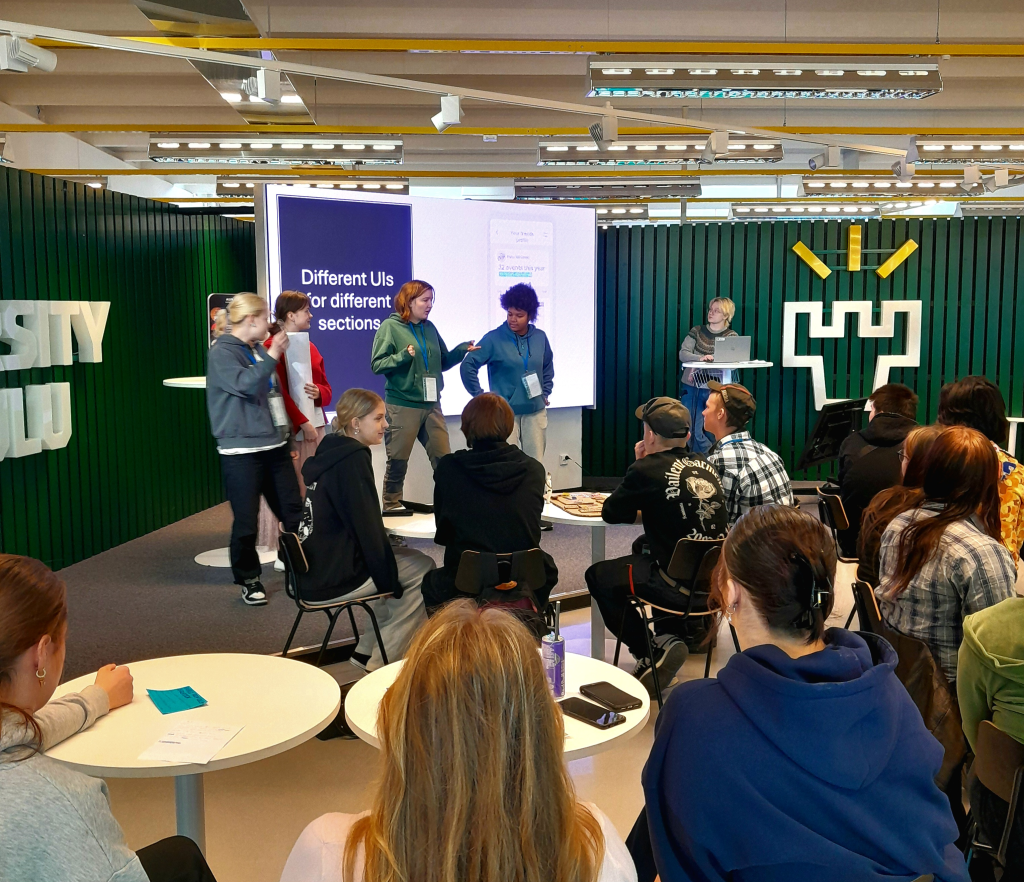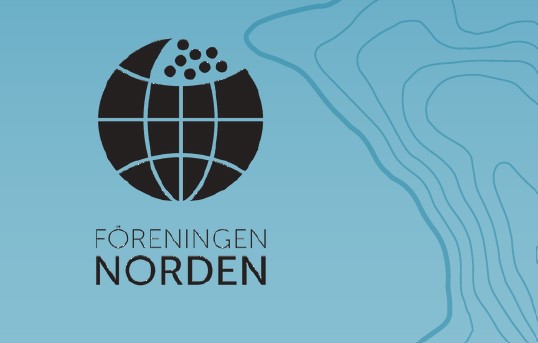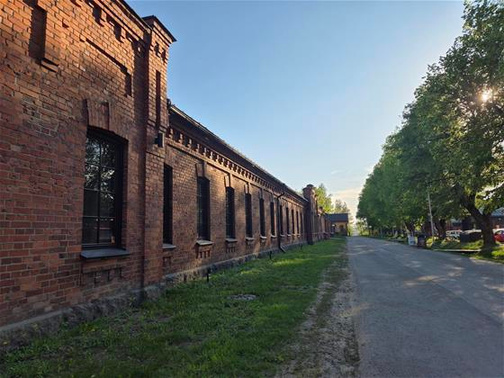Around 100 upper secondary students and teachers from Finland and Sweden gathered in Oulu for the STEAM Into Entrepreneurship innovation camp from April 23rd to 25th. The camp combines STEAM pedagogy with entrepreneurship education, helping students learn how to creatively solve challenges together and bring their ideas to life. Students from Oulu, Torne River Valley, and Norrbotten region worked in intercultural groups where English was the main language used.
The Innovation camp began with an opening lecture by Elise Pietarila (Gimmeyawallet Productions Oy), who spoke about creation and ideation. Her talk set the stage for the STEAM process that was then used during the Innovation camp. The main goals of the innovation camp are to introduce STEAM pedagogy, foster innovation, and encourage creative problem-solving in collaboration with others.
The event is part of the Aurora Entrepreneurialis project, which focuses on three key areas: sustainable entrepreneurship education, promoting an entrepreneurial culture in upper secondary education, and strengthening cross-border cooperation in the northern region. The goals for the innovation camp are to explore STEAM pedagogy, innovate new ideas, and apply creative problem-solving in collaboration with others.
Utilizing STEAM for Ideation and Planning
The STEAM process begins with choosing a goal and task. As a pre-assignment, students selected one of six different challenges based on the ToolCamp challenges. The options were: Fashion of the Future, Save the Bothnian Bay!, Surviving on Mars, An Invention That Should Never Have Been Invented, Energy from Co-operation!, and Participation in Society. On the first day, groups conducted background research related to their theme through company visits. During the research phase of the STEAM process, students explored their existing knowledge and made observations about their chosen problem.
On the second day of the Innovation camp, the teams began brainstorming and designing their projects. They used the information gathered from their background research to come up with possible solutions.
Lappia students Anna Shilgina, La Min Eain, Yu Nandar Kyaw, and Aatu Kärkkäinen (Oulun Normaalikoulun lukio) found the ideation process smooth:“The company visit on the first day gave us ideas and encouragement for our project. We tossed around ideas and discussed possible ways to implement them. It’s important not to give up during ideation—moving forward matters, and you can always return to old ideas.”
Students Juuli Uusitalo and Minja-Maria Tervo (Oulun Suomalainen Yhteiskoulun Lukio), along with Felicia Sannerborg, Filippa Pirinen, and Paula Duda (Tornedalsskolan), said the beginning of the STEAM process was the most difficult part: “At first, we were lost in the brainstorming process. Then one of us threw out an idea, and others began building on it. We landed on a topic that was meaningful to all of us, and from there, everything went smoothly.”
STEAM minor students from the University of Oulu participated in the event to support the secondary students’ project development. Sara Kontinaho and Reeta Kotilainen highlighted the importance of ideation in the STEAM process: “It’s important to throw out a variety of ideas, because some ideas can help develop others. Diverse ideation guides the beginning of the design phase.”
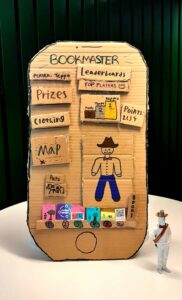
Ella-Maria Viero (STEAM minor student) highlighted the significance of the STEAM process during the event: “All phases of the STEAM process are equally as important for the workflow. You can always return to earlier steps. The first prototype in the implementation phase doesn’t need to be perfect either—it can still be revised. The key to the STEAM process is working together.”
Intercultural Collaboration Across Borders
Working in intercultural groups promotes cross-border cooperation between Finland and Sweden. Lappia students Anna Shilgina, La Min Eain, Yu Nandar Kyaw, and Aatu Kärkkäinen (Oulun Normaalikoulun lukio) felt that differences were a connecting factor: “We bonded easily at the beginning, and we feel that our differences actually bring us closer.”
Tornedalsskolan student Ali Reza shared similar thoughts: “Collaborating is really fun and gives you a new perspective on working together.” This was Reza’s first time participating in the Aurora Entrepreneurialis project, and he found the new experiences and collaboration to be very positive.
Lappia students Riia Arpi and Nea Kyntömaa, who have participated in all Aurora Entrepreneurialis event, noted that using English was not a problem: “Our language skills have improved through these events! If there are any communication issues, we just try to explain things more clearly. We have never had to use a translator!”
From Planning to Implementation and Sharing
After brainstorming and planning, the STEAM process continued with the implementation and sharing phases. On the second day of the event, the teams began building a more detailed prototype of their solution using real materials and techniques. If needed, they continued working on implementation on the third day.
In the sharing phase, the groups presented their final products to others. These presentations included a full overview of the group’s STEAM process and their completed solution. At this stage, students reflected on the decisions made during the STEAM process.
Innovation at Camp
The three-day innovation camp concluded with sharing projects on the final day. A jury awarded projects in seven different categories:
Collaboration – Category winners: Paula Duda, Felicia Sannerborg, FIlippa Pirinen, Minja-Maria Tervo, Juuli Uusitalo
Responsibility – Category winners: Edith Ek Strand, Tilde Berglund, Niko Parkkila, Ville Raiman, Agnes Lidström, Filippa Lindholm
Use of Technology – Category winners: Unna Linnatie, Nea Puumalainen, Aldin Gredelj, Aram Hakobyan, Theo Fång, Iija Kustula
Problem Solving and Innovativeness – Category winners: Pauli Taulavuori, Miska Tuisku, Onni Romppainen, Olivi Hinttala, Viivi Jukuri
Communication and Visuality – Category winners: Venla Komulainen, Topi Nätti, Veeti Pääkkölä, Sami Alatalo
Perseverance – Category winners: La Min Eain, Anna Shilgina, Yu Nandar Kyaw, Miro Haapakoski, Aatu Kärkkäinen
Overall best– Category winners: Pihla Raustia, Stella Rantala, Sointu Rantala, Hilla Jauhiainen, Kristiine Abong
The students’ projects included, among others, a game against bullying, a reading motivation app, an event calendar, a magnet developed for surviving on Mars, and multi-purpose jeans equipped with a QR-code containing instructions.
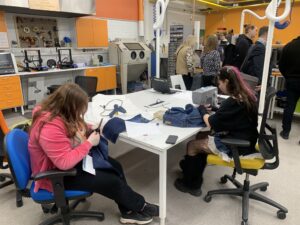
Ville Ahmala, a teacher at Oulu Teacher Training School’s upper secondary school, mentioned that students gain many new experiences from the events organized by the Aurora Entrepreneurialis project: “Students get a lot of new experiences from these events, which will carry them far in life. They did brilliantly at the innovation camp and refined important skills, such as problem-solving.”
The Aurora Entrepreneurialis project is carried out by the City of Oulu, Ung Företagsamhet Norrbotten, and Ammattiopisto Lappia. The project is funded by the Interreg Aurora programme, Region Norrbotten, and the Regional Council of Lapland. The three-year project aims to strengthen entrepreneurship education in upper secondary schools in Norrbotten and Northern Finland. Read more about the project.

